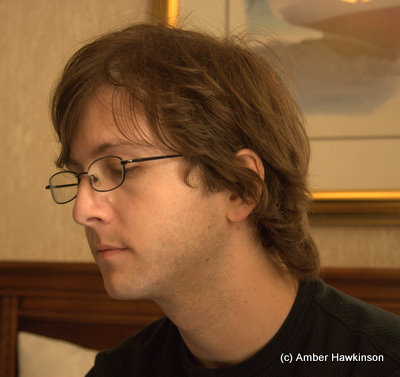
Which a Minute Will Reverse ««« 2011 »»» Know By Heart
10.01.11
-Thomas Szasz
The proverb warns that "You should not bite the hand that feeds you." But maybe you should, if it prevents you from feeding yourself.
The Wrong Color

| |
|
|
(If you have trouble sympathizing with a Caucasian male complaining of discrimination, pretend for the purposes of this entry that I am a Latina. If you cannot muster sympathy with that changed demographic, I hazard that you might be the type which whom I have an issue.)
True, I have witnessed less qualified women being hired over me for teaching positions because they are perceived have the right genitalia for nurturing and instructing on an undergraduate basis. (This is not to say that they aren't still paid less than they few males who manage to slip into the pink ghetto, because the sexism still fires in that direction. Likewise, this is not to malign most of the women with whom I have worked, who are as professional as their male counterparts.) I have gone to interviews where my time was cut short because someone in heels walked into the lobby, I have had to pick up the slack for tenured women whose qualifications are little more than chromosomal. I have had it implied that my interest in education is indicative of pathology, as though men only go into teaching in order to glimpse up cheerleading uniforms, a charge I have always found revolting.
But, despite all this, I see the sexism as relatively inoffensive, if grating. Administrators in interviews do not make comment as to the content of my underclothes. This bias is more subtle and I sometimes doubt they are consciously aware of their prejudices.
The racism I encounter is never less than pointed. I recently had a job interview where one of the interviewers came in and immediately said, and I quote, "You're white, you look like you weigh sixty pounds, and [the students] will think you are weak." The interviewer seemed to see nothing wrong with his racist condescension and mentioned my skin color three more times before I left, equating pale skin with congenital impotence and stupidity, telling me I would be assaulted for the crime of being born with pale skin. This did not bother him. At the school where I substitute, I was told - though not by someone in direct control of hiring - that I will never be full time because I am Caucasian and it is a minority district. This woman then asked me whether I wouldn't be happier working with "white children". Similarly, I was not rehired at a summer job where the director of the program said, in the middle of a staff meeting, that he would see to it that the only people coming back would be those who physically resembled the predominantly African student population. (Why this program boasted only one student of European descent among hundreds of African and Hispanic students is potentially a related issue.)
I do not feel that I am more discriminated against than some hypothetical person of minority, as has been challenged, but I am discriminated against and the response when I tell people this is to act as though I am a Klan member for even suggesting it is improper. (I even have trouble writing out my objection to this treatment, for fear my annoyance with racism and sexism will be taken for racism and sexism.) "Other people were discriminated against in the past!" they seem to shout. Now, it is clear, it is my turn to suffer or be blackballed under the assumption I am a misogynistic racial supremacist. Who would even take my discrimination lawsuit who would not also have Confederate flag boxers in his drawers? This is not bitterness, it is frustration. To see a calling at which one excels - one that could change lives - and to be prevented from fulfilling it by unapologetic bigots is revolting.
Yet it is not everyone who judges me before I can sit down. As I had another interview in the area, I called a school with whom I had interviewed a year ago. The secretary urged me to stop by, even though they had just filled their English teaching position. When I came in, the secretary hugged me. The dean seemed distraught that I had not shown up sooner. "I didn't even think of you. If I had, I would have offered you a contract on the spot, no questions asked. I always liked you. When I interview people, I throw in questions that aren't the typical ones, like what is your favorite color. That didn't even phase you, you talked to me like a person. We had a real conversation."
He then asks after my book and I recall that I still have a box of them in my trunk from the signing I had done weeks before. I bring one in and he asks how much it is. "$20," I say, a touch embarrassed at the price.
"I'll take five," he says without hesitation.
Soon in Xenology: Infatuation.
last watched: Tiptoes
reading: Dazzle
listening: Adele
Which a Minute Will Reverse ««« 2011 »»» Know By Heart
Thomm Quackenbush is an author and teacher in the Hudson Valley. He has published four novels in his Night's Dream series (We Shadows, Danse Macabre, Artificial Gods, and Flies to Wanton Boys). He has sold jewelry in Victorian England, confused children as a mad scientist, filed away more books than anyone has ever read, and tried to inspire the learning disabled and gifted. He is capable of crossing one eye, raising one eyebrow, and once accidentally groped a ghost. When not writing, he can be found biking, hiking the Adirondacks, grazing on snacks at art openings, and keeping a straight face when listening to people tell him they are in touch with 164 species of interstellar beings. He likes when you comment.